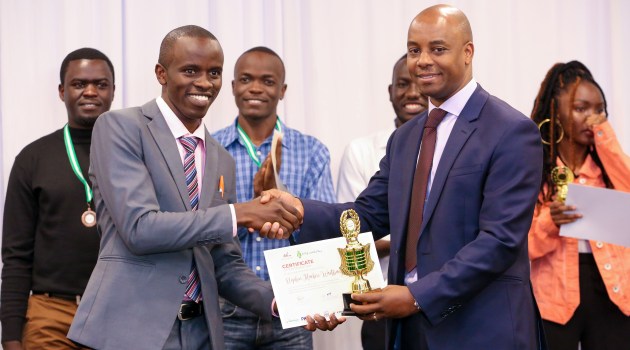
Safaricom Chief Corporate Affairs Officer, Stephen Chege presents a trophy and certificate to Stephen Muchiri for his Auto- Alcoblow innovation/Courtesy
NAIROBI, Kenya, Jul 12 – Two students from Jomo Kenyatta University of Agriculture and Technology have won this year’s #MyLittleBigThing SDG’s Innovation Challenge.
An initiative of MK-Africa in partnership with Safaricom , University of Cambridge South Africa and PKF among others, sought to create awareness on the Sustainable Development Goals (SDGs) among the youth, with the aim of encouraging them to come up with home grown solutions to Africa’s most pressing sustainability challenges.
Over 100 students participated in the challenge this year, with the winning innovation being Auto-Alcoblow, an alcohol detection and monitoring system created by Stephen Muchiri, who recently graduated from (JKUAT). The system measures blood alcohol levels by analyzing a driver’s breath and prevents ignition of a car engine by an intoxicated driver. It also switches off the vehicle in the event that a driver begins consuming alcohol while driving.
In second place was Ruth Wanjiru, a 22-year old student in her fourth year at JKUAT, whose Power in Plastics project aims to encourage the reuse and recycling of plastics, and empower low income communities.
Nkanai Cynthia, 19, from Kenyatta University came in third, with her Keep A Child Warm project. Using easily available local materials such as sisal fibre, recycled gunny bags and traditional lesos, Cynthia makes improvised blankets for distribution to street families, whom she also mentors.
“We recognise the broadness of the goals. We have therefore taken a thematic approach to enhancing SDGs capacity among university communities. Judges consider viability of the idea, adaptability and originality,” said Muthoni Kanyana, CEO, MK-Africa.
#MyLittleBigThing invites undergraduate students from universities across the country to submit innovation ideas around the first five SDGs, which are: No Poverty, Zero Hunger, Good Health and Well-being, Quality Education and Gender Equality. This year, entrants were required to submit a 2-3 minute YouTube video as well as a 200-word essay describing scalable and commercially viable ideas related to these goals.
“We are in a position to be the change we want to see, from a corporate and individual level. The youth can create sustainable solutions to the challenges we face, and that is what I find most inspiring about this forum. I hope that through initiatives such as this, we can inculcate sustainability thinking into our DNA and make it a way of life,” said Steve Chege, Chief Corporate Affairs Officer – Safaricom, when he spoke at the event.
In 2018, MK-Africa partnered with TIFA Research to conduct a survey on youth awareness and perceptions towards the SDGs. It found that the average awareness of the 17 Sustainable Development Goals among university students in Kenya stood at 45 percent compared to 54 percent for global university students.
To increase awareness and understanding of the SDGs among this demographic, MK-Africa designed a programme that includes the annual competition, online learning platforms and university SDG clubs, where students can learn from their peers and sustainability experts.
Safaricom, in line with its commitment to championing the SDG agenda, has invested approximately KES 3 million in #MyLittleBigThing since 2017, and contributed towards the setting up of SDG clubs in Kenyatta University, Jomo Kenyatta University of Agriculture and Technology, University of Nairobi, Moi University, Catholic University of Eastern Africa, Jaramogi Oginga Odinga University, and University of Eldoret.
This year’s winners will get the chance to will attend the Cambridge University Sustainability Practitioners Program in South Africa in August, which will be followed by a three-month incubation period for their projects upon their return.


































